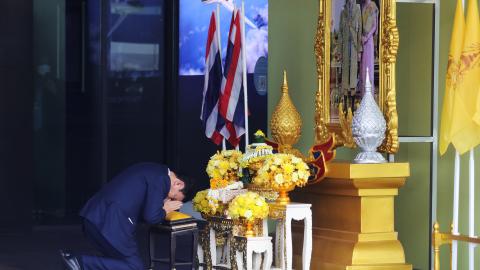Thailand’s former prime minister Thaksin Shinawatra, who was overthrown in a September 2006 coup and subsequently convicted of corruption, is back in the country after years in exile. His party is back in power, and Thailand’s king has commuted Thaksin’s sentence. The king and Thailand’s all-powerful military had to reconcile with Thaksin and his populist party to keep a left-wing party out of power.
Thaksin’s party has won the largest number of seats in every Thai election since 2001, until now, when it was edged out by the anti-military Move Forward Party. In the last 22 years, a pattern with which Pakistanis are familiar, was repeated in Thailand. Thaksin’s original party was disbanded by the Constitutional Court in 2007 on grounds of corruption and he and 110 of his closest associates were barred from contesting the polls.
Thaksin’s sister, Yingluck Shinawatra, won elections and became prime minister, while his party changed names. She was also charged with corruption and removed from office. In the 2023 elections, Thaksin’s followers rallied behind his daughter, Paetongtarn Shinawatra, another party member who became prime minister as a result of the post-election negotiated settlement.
Thailand has witnessed 13 successful and eight unsuccessful military coups since 1932. The country’s constitution has also been changed several times as have its electoral rules. Thai courts have frequently disqualified politicians and given judgments to disband political parties. But none of these non-political solutions have truly changed the face of Thai politics. Instead, these efforts to ostensibly clean up politics have only made the country chronically unstable.
Thailand’s monarchy, its urban elite, its officers corps, its civil servants, and its professional middle class have long resented corrupt, dynastic politics – and for good reason. They argue that the poor peasants simply do not elect the right people and the country’s politicians care only about themselves and not about the country. The Thai political class is notoriously corrupt and self-centered. But repeated non-political interventions have proved ineffective in ending corruption or in changing the fundamental political trends of Thailand.
Political turmoil and unpredictability has, in the past, interfered with Thailand’s economic performance. The country has a strong macroeconomic policy framework (something Pakistan does not have) and expects to earn $64 billion from tourism alone this year.
Decades of political turmoil have taught Thailand’s political actors a valuable lesson. They all seem to agree that their political games must be played in a manner that avoids shaking up the country’s economy. Thus, even when allegations of corruption result in a politician’s disqualification from politics, authorities do not always undermine his/her businesses.
Thais understand that the political fortunes of individuals and families, even when amassed through corruption, still count towards the Gross Domestic Product (GDP.)
The result of the latest elections held in May resulted in economists worrying about political and fiscal uncertainty in Thailand. The compromise facilitating Thaksin’s return was a response to those concerns.
Pakistan does not have the cushion provided by Thailand’s tourism earnings nor is it part of a regional grouping like the Association of Southeast Asian Nations (ASEAN), with intra-regional trade of $450 billion and robust intra-regional investments (which in 2021 amounted to $29.9 billion). Pakistan’s powers-that-be and the political class have yet to agree on ground rules whereby perennial political conflict and non-political interventions do not damage the country’s economy.
In advanced democracies, the point of democracy is to let people choose whomever they like, and then vote them out of power upon discovering that their chosen leaders did not fulfil their aspirations. In countries like Thailand and Pakistan, professional elites and the establishment often do not understand the reasons for the success of populist (and corrupt) politicians like Thaksin and use administrative and legal tools to alter politics.
Successful third world democracies are born out of cooperation between politicians with vote banks and middle class professionals (including economists, scholars, and jurists). In countries like Pakistan and Thailand such cooperation is scarce. But politicians connect to the people in a way judges and civil or military bureaucrats do not, and retain support even after being jailed or disqualified.
Through much of Pakistan’s history, the political preferences of the professional middle class have differed from those of the masses. After the peasantry had voted for the Pakistan People’s Party (PPP) and Zulfikar Ali Bhutto in 1970, the urban middle class and military pensioners supported Air Marshal Asghar Khan and his Tehrik-e-Istiqlal (TI), whom they considered more patriotic and incorruptible.
The 1977 Pakistan National Alliance (PNA) campaign of 1977 revealed that the anti-PPP vote bank was mobilized not by TI or Asghar Khan but by the Islamist religious parties. After the end of Ziaul Haq’s martial law regime in 1988, and a concerted decade-long effort by the establishment to break the back of the PPP, Benazir Bhutto still commanded more votes than the urban middle class’s new choice, Nawaz Sharif in 1988.
Once Nawaz Sharif became popular and created his own vote bank across the country, the urban professionals turned towards a populist celebrity who presented himself as an anti-politician politician. But this experiment has also added to volatility instead of ending it on a permanent basis.
In politics, there are no surgical solutions. History tells us that governance is not about ‘setting things right’ once and for all. Politics is about running things right as far as possible. Some problems, like corruption, have to be endured and resolved over time. Non-political interventions, be they coups or extra-legal judicial pronouncements, do not always help.
The solution to having a bad surgeon is not to invite an engineer to perform surgery. Nations must organically replace bad politicians with good ones. Trying to push popular politicians out of the game while creating new ones divides societies without solving their problems. Thailand’s experience (and Pakistan’s too) proves that.















